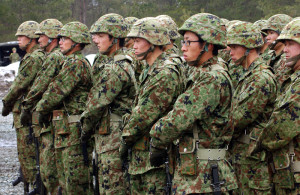
Recently, Tokyo sent an official protest to China and South Korea, in connection with the opening of a memorial in the city of Harbin, dedicated to the Korean member of the underground who shot the first Japanese governor-general of Korea in 1909. “This step is extremely regrettable,” said the spokesperson of the Foreign Ministry of Japan. As a result, there was a deterioration of relations between the two countries.
Referring to the history of this issue, we should recall that the Korean member of the underground, An Jung-geun, shot the first governor of Korea, Prince Ito Hirobumi, near the Harbin Train Station in October 1909. The assassin was captured and hanged in prison in Japan in 1910. An Jung-geun is considered a national hero in Korea.
It is also worth noting that in 1905, Korea came under the “protectorate” of Japan at first, and then from 1910 to 1945 it was under direct Japanese occupation, during which time the Japanese authorities committed numerous crimes against the Korean people. Japanese government pursued a policy of ethnocide against the Koreans during these years. Koreans were forced to use the Japanese language and to change their names into Japanese ones, Korean women were forcibly made sex slaves of the Japanese, and Korean men were forced into labour camps. The desperate Koreans tried to fight back. On March 1, 1919, a popular uprising started in Korea, during which more than 7,000 people were killed.
China also suffered from Japanese occupation and sustained significant losses. Crimes of the Japanese military are etched in the memories of the Chinese people forever. Samurais beheaded Chinese peasants, poisoned them with gas (about 60,000 people were killed), raped women and bayoneted children.
From May 3 to 11, 1928, the Japanese, which attacked the Chinese province of Shandong, killed 6,123 Chinese citizens and inflicted injuries to 1,700 more people in Jinan. In Pingdingshan (near the Fushun Coalmines), samurais massacred civilians, killing more than 3,000 people on September 16, 1932. Finally, after seizing Nanjing on December 13, 1937, the Japanese, during 6 weeks, killed more than 300,000 civilians and disarmed prisoners of war, on the orders of their commanders. This atrocity, which shocked the whole world, is not inferior to the atrocities of the Nazis, in terms of its scale and character.
This entire bloody orgy, organized by the Japanese in Asia, was stopped only in 1945 after the defeat of the Kwantung Army by the armed forces of the USSR.
Needless to say, Korea and China have many common memories associated with the atrocities of the Japanese military. One must not forget such things, and this is not made easy, especially given the conduct of the current Japanese government.
Thus, on December 26, 2013, the Japanese Prime Minister (this time Shinzo Abe) once again visited the Yasukuni Shrine in Tokyo, where, according to the legend, rest the souls of Japanese military killed in battles. The names of 14 war criminals of World War II are also listed on the commemorative plaques with the names of 2.5 million soldiers and officers who died for Japan in various wars. Naturally, such actions of Japanese prime ministers cause negative reactions in Beijing, Seoul and Pyongyang, who regard visiting of the Yasukuni Shrine by officials of the Land of the Rising Sun as an insult to the national feelings of the Chinese and Korean peoples.
Imagine visiting burial places of Alois and Klara Hitler, who “gave” the great Fuhrer to Germany, by European political leaders. How would the world react to this? – Baltic SS veterans, together with their governments, would obviously feel pleased, but then, no one is deluded that the world consists of only sensible people. Alas, Nazi supporters also exist. By the way, German chancellors do not regret the construction of monuments to members of the Soviet underground in Russia.
The Secretary General of Japanese Cabinet Yoshihide Suga, in one of the press conferences in November, said: “We informed the Government of the Republic of Korea that we were talking about a criminal here (meaning An Jung-geun), and such actions will not benefit our relationship.”
As for criminals and their actions, Mr. Suga has obviously forgotten, or never knew, that the Tokyo trial was held in Japan from May 3, 1946 to November 12, 1948, almost parallel with the Nuremberg trials. Seven people from the former leadership of Japan were executed, 16 people were sentenced to life imprisonment, and two people were sentenced to limited imprisonment terms. During the investigation stage, several people died and one was declared insane – this was Shumei Okawa, the former chief propagandist of the empire. That also happens.
There is an opinion that the representatives of Japanese ruling class still consider themselves “Übermenschen” (overmen), and believe that one day they will become lucky and rule over the “inferior” races in the East. It should be understood that this fact is well realized in Beijing, Pyongyang and Seoul, even despite some differences in their views on Juche ideas. Besides, Uncle Sam, with his entire naval aviation and national exclusiveness, is backing Tokyo, and Prime Minister Abe proposed furthermore the policy of “active pacifism”. This would manifest itself in the strengthening the country’s armed forces. But Japan’s military budget is already one of the largest in the world now, so there is probably no need to “pacify” things even further.
If Washington is so busy responding to “challenges”, then why should Beijing not do the same? China’s economy is booming and the country needs to protect its investments. Beijing does not like the revival of Japanese military forces and the creeping rehabilitation of the samurai thugs. In addition, there are still the unresolved territorial claims of Japan.
In short, the settlement of East Asian relations is far from complete today, and many of their members will still have to work hard in this direction.
Konstantin Penzev, author and historian, observer at the online magazine “New Eastern Outlook”.
